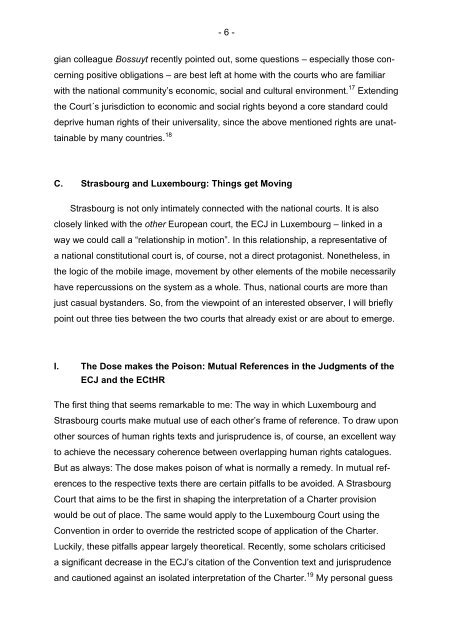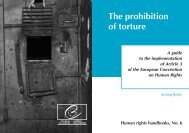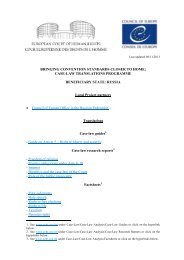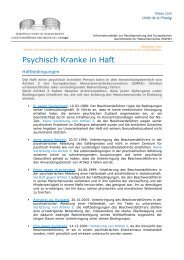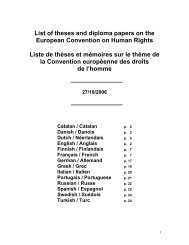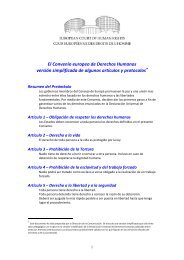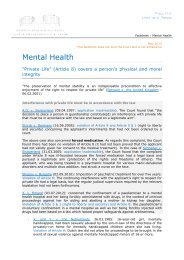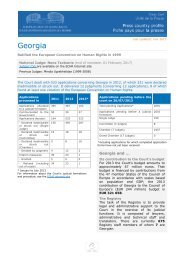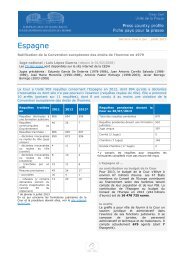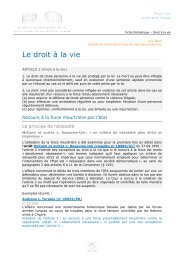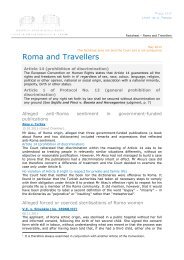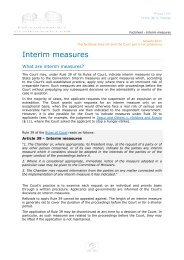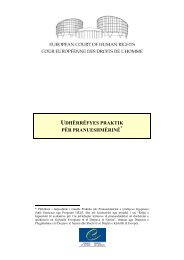Speech by Andreas Voßkuhle - European Court of Human Rights
Speech by Andreas Voßkuhle - European Court of Human Rights
Speech by Andreas Voßkuhle - European Court of Human Rights
You also want an ePaper? Increase the reach of your titles
YUMPU automatically turns print PDFs into web optimized ePapers that Google loves.
- 6 -<br />
gian colleague Bossuyt recently pointed out, some questions – especially those concerning<br />
positive obligations – are best left at home with the courts who are familiar<br />
with the national community’s economic, social and cultural environment. 17 Extending<br />
the <strong>Court</strong>´s jurisdiction to economic and social rights beyond a core standard could<br />
deprive human rights <strong>of</strong> their universality, since the above mentioned rights are unattainable<br />
<strong>by</strong> many countries. 18<br />
C. Strasbourg and Luxembourg: Things get Moving<br />
Strasbourg is not only intimately connected with the national courts. It is also<br />
closely linked with the other <strong>European</strong> court, the ECJ in Luxembourg – linked in a<br />
way we could call a “relationship in motion”. In this relationship, a representative <strong>of</strong><br />
a national constitutional court is, <strong>of</strong> course, not a direct protagonist. Nonetheless, in<br />
the logic <strong>of</strong> the mobile image, movement <strong>by</strong> other elements <strong>of</strong> the mobile necessarily<br />
have repercussions on the system as a whole. Thus, national courts are more than<br />
just casual <strong>by</strong>standers. So, from the viewpoint <strong>of</strong> an interested observer, I will briefly<br />
point out three ties between the two courts that already exist or are about to emerge.<br />
I. The Dose makes the Poison: Mutual References in the Judgments <strong>of</strong> the<br />
ECJ and the ECtHR<br />
The first thing that seems remarkable to me: The way in which Luxembourg and<br />
Strasbourg courts make mutual use <strong>of</strong> each other’s frame <strong>of</strong> reference. To draw upon<br />
other sources <strong>of</strong> human rights texts and jurisprudence is, <strong>of</strong> course, an excellent way<br />
to achieve the necessary coherence between overlapping human rights catalogues.<br />
But as always: The dose makes poison <strong>of</strong> what is normally a remedy. In mutual references<br />
to the respective texts there are certain pitfalls to be avoided. A Strasbourg<br />
<strong>Court</strong> that aims to be the first in shaping the interpretation <strong>of</strong> a Charter provision<br />
would be out <strong>of</strong> place. The same would apply to the Luxembourg <strong>Court</strong> using the<br />
Convention in order to override the restricted scope <strong>of</strong> application <strong>of</strong> the Charter.<br />
Luckily, these pitfalls appear largely theoretical. Recently, some scholars criticised<br />
a significant decrease in the ECJ’s citation <strong>of</strong> the Convention text and jurisprudence<br />
and cautioned against an isolated interpretation <strong>of</strong> the Charter. 19 My personal guess


